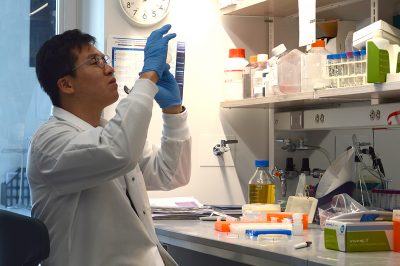
THARMARAJAH/ DAILY FREE PRESS STAFF
Boston is the second best metro area in the nation for STEM (science, technology, engineering and math) professionals to live, according to a recent report by WalletHub, a personal finance website.
Seattle, Washington, came first in the rankings, which were based on 17 metrics which evaluated three general categories: professional opportunities, friendliness to the STEM fields and quality of life for residents.
Boston ranked highly against other STEM cities in many of the metrics. The Boston-Cambridge-Newton area tied for fourth place with Raleigh, North Carolina, for the highest percent of the workforce in the STEM fields. The Boston metro area also tied with Springfield and Worcester for first place in math performance.
WalletHub analyst Jill Gonzalez said in an emailed statement provided to The Daily Free Press that she predicts further growth in the STEM industries in Boston.
“… the fact that Boston has five engineering universities in the top 100 Best Engineering Schools ranking, definitely plays a part in the growth of STEM industries,” Gonzalez said. “… There seems to be a growing trend that will continue at least in the next couple of years, as the projected number of STEM jobs needed in 2020 is 3.74% of the population, the second highest in the country.”
Barbara Hughey, associate director of the Women’s Technology Program at the Massachusetts Institute of Technology, wrote in an email that she has seen growth at MIT in the number of undergraduate women working in fields where they are underrepresented, increasing from around 35 percent when she began in 2002, to 50 percent in recent years.
“This creates a trickle-down, since many of these women stay in the Boston area after graduating and join local firms – or start their own,” she wrote.
Brighton resident Jhosselin Quiroz, 24, who is a master’s student at Northeastern University, said she was initially attracted to Boston because of its top-tier universities.
“The quality of the academic programs here is really impressive,” Quiroz said. “As an international student, I decided to come here to study because of the quality of the education.”
High-tech jobs continue to be on the rise in Boston, according to the the Boston Planning and Development Agency, which reported that jobs in the city’s high-tech industries averaged 11 percent annual growth rate between 2010 and 2016.
Angos Oliveira, 27, of Revere, said Boston could be described as a hub for the STEM fields.
“Boston has the best universities and hospitals,” Oliveira said. “It gives people the opportunity to go into their fields.”
Founder of the Boston STEM Fair Cyndi Reitmeyer said she sees a link between Boston’s booming STEM workforce and the education system in Massachusetts.
“Education has always been a priority in Massachusetts,” Reitmeyer said. “I think that, from the administration on down, they recognize from a curriculum standpoint that we need to be leading in STEM.”
Reitmeyer, who first entered Boston’s tech workforce 20 years ago at E-Ink, a tech startup out of MIT’s Media Lab, said she thinks the startup industries in technology are continuing a trend of growth.
“A lot of young companies are coming here and starting and staying,” he said. “[The workforce] is more diverse than ever … we’re healthy and strong.”
Kyle Rundles, of East Boston, said he thinks it makes sense that Boston has become a hub for these industries.
“There are so many universities here, and they’re focused on developing new research and technology,” the 32-year-old said. “It makes sense that Boston would be a hub for that.”
Guthrie Kuckus contributed the reporting of this story.
















































































































